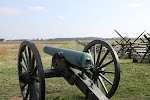The
years following the Civil War were especially hard for newly-freed slaves. With
no homes, no money, and no prospects, one can imagine the hopelessness that
came with freedom.
To
help, President Abraham Lincoln advocated for a bill to establish an organization to
assist freedmen.
On
March 3, 1865, Congress passed the Freedmen's Bureau Bill. The new agency was
created within the War Department, the only federal agency with a structure
that could be assigned in the South to assist freed slaves in obtaining relief,
land, jobs, fair treatment, and education.
 |
| Recently freed slaves meet with the Freedmen's Bureau |
The
Freedmen's Bureau arranged for schools and served as legal advocates for
African Americans in both local and national courts, mostly in cases dealing
with family issues and property issues. Assistance was also provided to help
African Americans find family members who had become separated during the war.
The Bureau encouraged former
The
Bureau divided Louisiana into districts, each containing one to three parishes.
Each district was assigned an agent, an army officer if possible, but when they
could not be obtained, a citizen was appointed. Most of the officers were in
the Veteran Reserve Corps, such as New York native Lieutenant Simeon G. Butts
whose office was in Vernon in Jackson Parish.
When
civil war broke out, Butts had joined the 11th Michigan Infantry, leaving
behind a wife and three small children. After suffering a series of ailments
and then injury in a train wreck, the army sent Butts to the Invalid Corps
where he was assigned noncombatant duties. After the war, he was appointed as a
Second Lieutenant in the 12th Volunteer Reserve Corps and sent to Louisiana
with the Freedman's Bureau.
In
a report on the Freedmen's Bureau, the overall commander of the U.S. Army
occupation forces in Louisiana during Reconstruction, General William T.
Sherman, wrote, "As a general thing the agents have been treated very
courteously by the people of their respective parishes. There are some
exceptions, however. In some portions of the State (principally the northern
and northwestern) our officers and agents are insulted and threatened "
Butts,
who had survived bouts with illness and a serious train wreck during the war,
would not survive the seemingly innocuous duty as a low-level government social
worker.
North
central Louisiana's West-Kimbrell gang consisted of the state's most notorious
outlaws during the Reconstruction era. Much has been written about the clan
based in Winn Parish but often the stories were based on unsubstantiated
legend. The official record is slim the gang was adept at keeping much of its
activity secret.
Monroe's
Ouachita Telegraph noted the outlaws, known as the Nightriders, "headed by
a man named West, have been operating as highwaymen with unvarying success ever
since the close of the war, and perhaps before its close, and have sent
unheralded and unprepared into eternity the soul of many an innocent victim,
stimulated thereto solely by an ungodly greed for gain."
John
West and the Nightriders preyed on travelers traversing central Louisiana
headed to Texas, killing entire parties, dumping the bodies in wells, and
absconding with all the victims' property leaving no evidence of their fates.
On
July 7, 1866, Lieutenant Butts and his captain left Natchitoches with an army
payroll bound for Vernon. After spending the night in St. Maurice, Butts
continued alone, spending the second night at a home near the village of
Lewisville in Winn Parish.
Three
months later, his bones were found next to a spring three miles from the house
where he had spent the night. General Sherman wrote his superiors that,
"Every effort has been made to obtain some trace of the party who
committed the cowardly act, but without avail." The murder was denounced
in New York newspapers and across the country.
When
locals had finally had enough, the Nightriders were destroyed in 1870. Only
then did the full story of Butts's fate became known.
The
Ouachita Telegraph told the story in a lengthy article on May 27, 1870:
"Mrs. West and a man named Dean, one of West's accomplices, now clear up
the mystery of the Lieutenant's death. He was killed by West not far from the
Saline Mills in Winn Parish. Information had been conveyed to West that the
Lieutenant had drawn $2,700 at Natchitoches.
"West,
Dean and another man overtook Butts on the road, and to allay suspicion told
him they were hunting cattle. Riding on, they came to a point near which there is
a fine spring. Butts was induced to turn off to the spring to get some water.
While drinking from the spring, West deliberately shot the unsuspecting man
through the head until now the manner of his death was a profound
mystery."
 |
| Lt. Butts's marker in Kistachie National Forest in Winn Parish |
The
spring where Butts died would thereafter be called Yankee Springs. A Baptist
church and cemetery were established near his burial spot. The grave was marked
but the exact spot was lost over time. Local historians located the approximate site and recently installed a marker for Lt. Butts. The grave is
within the Kisatchie National Forest.














No comments:
Post a Comment